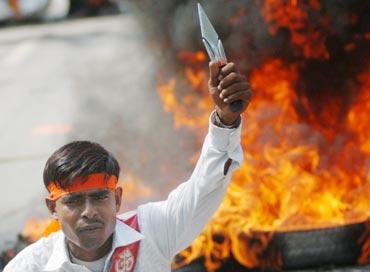The confessions of a religious teacher are a reminder of the dangers of Hindu nationalism, reports Sanjay Kumar. So how big is the threat of terrorism?


I know I could be sentenced to death, but I still want to make the confession,’ Naba Kumar Sarkar told the metropolitan magistrate in a lower Delhi court last December. His move was, he said, an act of atonement after he learned of how someone else had been wrongly arrested.
Such a decision would usually be noteworthy, but not headline making. What was unusual about this confession was who it was coming from. Sarkar, also known as Swami Aseemanand, was no ordinary criminal standing before the courts. Being a Swami—a revered religious teacher in the Hindu religion—Aseemanand is supposed to symbolize virtue. But instead, he was in court over claims that he has been closely involved with Hindu nationalist terrorist attacks that took place in western and southern India between 2006 and 2008.
Aseemanand is believed to belong to the Rashtriya Swayamsevak Sangh (RSS), an organization that propagates Hindu nationalism, and which is intolerant of other religions, particularly Islam and Christianity. His confession, recorded in front of a magistrate, included talk of his involvement with terror attacks conducted with the help of friends. It also shed light on a previously murky brand of terrorism.
India’s Home Minister Palaniappan Chidambaram describes the phenomenon as ‘saffron terror’, although the ruling Congress Party prefers ‘Sangh terror,’ in recognition of the importance of RSS. Most of the media, though, prefer a broader tag: ‘Hindutva terror’.
Regardless of the name it is given, it has become increasingly clear that the popular perception of Islamic groups as being behind virtually all of the terrorist incidents in India in recent years is hugely misplaced.
Aseemanand’s confession suggested that Hindutva brigades have been behind a spate of high-profile incidents—the terror attacks in Malegaon in Maharashtra (2006, 2008) the Samjhauta Express bombings (2007), a bomb blast at the Sufi shrine in Ajmer Sharif (2007), the Mecca Masjid bombing, and an attack in Modasa in Gujarat (2008).
Yet at the time of these crimes, Muslim organizations and individuals were arrested in significant numbers, revealing a justice system skewed against Muslims. Some of those arrested over the attacks are still behind bars.
‘There’s obviously an inbuilt bias against Muslims in certain states and among a section of police personnel,’ says Prof. Mahesh Rangarajan, a noted political analyst. ‘Political leaderships should look into it and justice should be given. (There should be) compensation for the people wrongfully held, actions against the erring officials should be taken. This violation of rights isn’t good for the country as a whole.
source..... THE DIPLOMAT


No comments:
Post a Comment